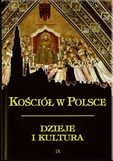DOROBEK HISTORIOGRAFICZNY POLSKICH HISTORYKÓW KOŚCIOŁA OSTATNIEGO 50-LECIA CHARAKTERYSTYKA OŚRODKA DOLNOŚLĄSKIEGO (WROCŁAW)
Historiographical achievements of Polish historians of the Church in Lower Silesia (Wrocław)
Author(s): Michał PielaSubject(s): Christian Theology and Religion, History of Church(es), Theology and Religion
Published by: Katolicki Uniwersytet Lubelski Jana Pawła II - Wydział Teologii
Keywords: Biographical entry (professors, researchers); Teaching and academic activity; Works in archival studies and library science; Works about Silesia; church history in Silesia; Wrocław; Bishops of Wrocław
Summary/Abstract: The corpus of writings by Polish church historians after 1945 in Lower Silesia is undoubtedly signi cant. One of the outstanding church historians was surely Bishop Wincenty Urban, who presided at the meetings of Polish historians and at conferences for 23 years. For many years he held managerial positions at the Archdiocesan Archives and Museum in Wrocław and at the chapter Library in Wrocław, and his important works in archival studies and library science were continued by his successors: Rev. Prof. Józef Mandziuk, and especially by Rev. Prof. Józef Pater. Academic research about Silesia and church history in Silesia was the eld of interest for the following professors: Bishop Wincenty Urban, Rev. Józef Mandziuk, Rev. Józef Pater, Rev. Józef Swastek, Rev. Władysław Bochnak, Rev. Antoni Kiełbasa (with a special emphasis on promoting the person and cult of St. Hedwig and her shrine in Trzebnica), and Rev. Tadeusz Fitych. This research bore fruit in their writings, in their teaching at the Ponti cal Faculty of Theology in Wrocław, and in their collaboration with other academic centers. Other researchers into the catholic church in Lower Silesia focused on the history of the religious in- stitute of the Sisters of Saint Elizabeth and of the Society of Jesus in that area (Rev. Prof. Zdzisław Lec), on parish and local structures (Rev. Prof. Mieczysław Kogut, Rev. Dr. Hab. Norbert Jerzak), on the local history on the diocesan level (Rev. Dr. Stanisław Kusik), on history of religious institutes and history of the Faculty of Theology at the University of Wrocław (Rev. Dr. Hab. Tomasz Błaszczyk) or on pastoral, church and political aspects of the activities of cardinal Adolf Bertram, archbishop of Wrocław (1914-1945) and President of the Bishops’ conference of Fulda (1920-1945) (Rev. Dr. Hab. Michał Piela SDS, Prof. PWT). Among the achievements there are also works of some passionate amateur historians, such as Rev. Wacław Sztelelnicki, protonotary apostolic, who focused on the history of the Archdiocese of Wrocław and of the Archdiocese of Lviv, and Prelate Stefan Wó- jcik, author of important studies in the history of the church in the Archdiocese of Wrocław. This important heritage of the church historiography in Lower Silesia is continued successfully by young historians.
Journal: Kościół w Polsce. Dzieje i kultura
- Issue Year: 2015
- Issue No: 14
- Page Range: 51-84
- Page Count: 34
- Language: Polish

